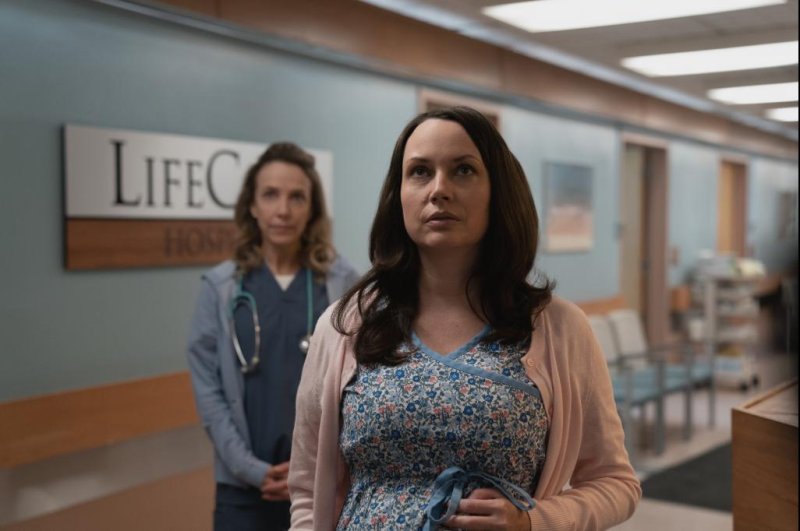1 of 6 | Diane Robichaux (Julie Ann Emery, R) must manage LifeCare when the power goes out during Hurricane Katrina. Photo courtesy of Apple TV+
LOS ANGELES, Aug. 10 (UPI) -- The cast and creators of Five Days at Memorial, premiering Friday on Apple TV+, said the Hurricane Katrina drama shows how little has improved since the New Orleans crisis.
In the show, Julie Ann Emery plays Diane Robichaux, the real-life incident coordinator at LifeCare, an elder care facility that rented a floor at Memorial Hospital in 2005.
"We assume if people are in a hospital, they're taken care of, and it's not true," Emery told UPI in a recent Zoom interview. "When the community is suffering from a lack of resources, so is the hospital, and we saw that so starkly during COVID."
Flood waters knocked out the power at Memorial Hospital, and administrators struggled to persuade government and military officials to help evacuate them. The show, based on Sheri Fink's book, depicts how executives off site ordered the medical staff to abandon high-risk patients.
"There are people in boardrooms making business decisions that should be human ones," Emery said. "I hope there's a real conversation to be had here about corporate medicine, the failings of corporate medicine."
Cherry Jones plays Susan Mulderick, incident commander for the rest of Memorial Hospital. Jones said while filming Memorial in Toronto in 2021, cast members from New Orleans checked in on their homes during Hurricane Ida.
"One of the actors' homes was flooding while we were in Toronto on the anniversary of Katrina," Jones said. "The people that the series is based on were all in our hearts and minds through the whole thing."
Carlton Cuse created Five Days at Memorial with John Ridley, adapting Fink's book. Cuse said development began in 2019, and working through the COVID-19 pandemic added resonance to the story of a hospital crisis.
"A lot of the same things and a lot of the same issues that we dealt with in Hurricane Katrina, we ended up dealing with during the pandemic," Cuse said. "I think that everyone who watches our story will bring that perspective to it."
With power outages and dwindling resources, Memorial doctors had to make difficult choices about which patients to prioritize for care. Cuse said doctors still face such choices during the pandemic.
"We have 8 or 9 billion people on the planet," Cuse said. "Who gets vaccines? Who got monoclonal antibodies? What is the treatment difference between someone at a public inner-city hospital and a fancy private suburban hospital?"
After the events of Katrina, Louisiana charged Dr. Anna Pou, played by Vera Farmiga on the series, with murder for morphine-induced deaths. A grand jury decided not to indict Pou, and her record has been expunged.
"I tried to put myself in her shoes to understand what she was up against, the exhaustion, the sleep depravity, the frustration, all the stamina it required -- and her intentions," Farmiga said.
She said she believed Pou's intentions were "to do her darndest to cure people and help people."
The real Pou, Mulderick and Robichaux were not involved with making Five Days at Memorial. The cast and creators said they relied on Fink's book, and in Emery's case, Fink provided additional research material on Robichaux.
Emery said Fink had additional information about Robichaux's relationships with nursing staff at LifeCare, which were not explicit in the show. Emery also read accounts by Robichaux's co-workers that painted a consistent portrait of her leadership style.
"She's very compassionate," Emery said. "She tries to keep things light when she can. She tries to keep everyone as calm as possible, all while physically struggling on her own."
Farmiga also noted Pou's compassion, saying she volunteered to work during Katrina and remained when she had a chance to leave.
"That's what she does," Farmiga said. "That's her vocation. She was there when she didn't have to be. She volunteered to be there on a day that she was off. And her objective was to alleviate suffering."
Robichaux was seven months' pregnant during Hurricane Katrina. Emery learned that pregnancy added additional exhaustion to the sleep deprivation and dehydration the staff experienced several days into the storm.
"Pregnant people need about twice the water as non-pregnant people," Emery said. "So severe dehydration would have set in very quickly for her. It comes with a very specific set of physical ailments -- cramping and aches and retaining water everywhere."
Jones said evacuating Memorial was exacerbated by a lack of resources to move patients out of harm's way. Ultimately, Mulderick relied on citizens sailing their own boats through the flood waters.
"I think everyone kept waiting for the cavalry to show up, and finally they realized there was no one showing up," Jones said. "The Coast Guard was unbelievable during Katrina, but there were only so many of them. When people start showing up in their own boats, it must have just been incredible."
Five Days at Memorial premieres with three episodes, then new episodes premiere Fridays on Apple TV+.














